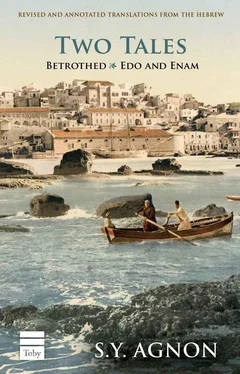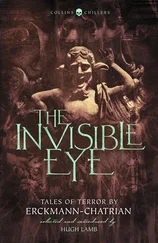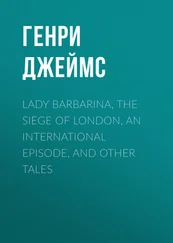The Consul was very pleased with the city. True, what he had seen with his own eyes was unlike the Jerusalem of legend or the Jerusalem of his imagination. There were many things that could well have been dispensed with and also many things lacking that might well have been there. But since one did not really know where to make a start, or how to proceed in the way of reform, it was best to leave Jerusalem as she was.
Once again, Rechnitz is seated facing the Consul in the Jaffa hotel. The weather is chilly, the air damp; hot embers glow in the copper tray before them. The Consul has a thick cigar in his mouth and a woolen rug rests on his knees. He warms his hands alternately with the cigar and over the hot coals. Shoshanah is some distance away, wrapped in her beaver coat. The coals whisper to themselves and the tray, reflecting their red glow, whispers back. The room grows warmer, the air more heated; a sweet languor seeps into the spoken word, like the languor that surrounds the body. From the sea outside the sound of waves mounts like the distant roaring of beasts of prey. The Consul shakes the ash from his cigar and remarks, “Today it’s impossible to take a walk on the beach.” And Rechnitz blushes; can the Consul be alluding to the walk he had taken with Shoshanah?
But in fact the Consul was only referring to the stormy weather that had delayed his departure. What is more, he was glad that he did not have to travel, after wandering from country to country for over a year. He had seen so many lands: more than he could number, more names than he could remember. If he had not listed in his notebook the name of each place visited he would never have known where he had or had not been. Shoshanah too was glad of the delay. She had taken many photographs and collected many souvenirs and now she needed time to arrange them.
On the day of her return from Jerusalem Shoshanah had been very fatigued. Without finishing her meal she had left for her room and gone to bed. But on the next night she lingered over dinner. Unasked, quite of her own accord, she brought an album of her photographs and souvenirs to show to Jacob. She was astonished at the way he recognized each object and gave it its proper name, and even happier at the serious interest he took in her collection. And because she was grateful, she wanted to repay him by recounting various stories. That night, Shoshanah told Jacob many tales. This was one of them: “Once upon a time there was a king who wished to marry me. This king had a fine palace made of palm fronds, and he also had two wives. One of these wives wore sardine tins in her earlobes to enhance her beauty; the other one looked just like the girl you were walking with on the day I arrived in Jaffa. But,” added Shoshanah, “you were out with two girls together and as I don’t know which is which, I can’t tell you which one looks like the king’s wife.”
The Consul laughed and cried in surprise, “What? Do you take girls out for walks? I thought scientists were completely wrapped up in their work! It looks as though science is a complacent mistress who doesn’t object to rivals. Tell me, Shoshanah, are they pretty, these two girls?”
Shoshanah looked at Jacob and answered, “That is for you to say.”
“If,” said her father, “he is thinking of his own reputation, he will answer that they are extremely beautiful; if he is thinking of yours, he will say they are not at all attractive. And so, my dear daughter, you tell me — are they good-looking?”
Shoshanah replied, “Whatever I may say, Dr. Rechnitz thinks they are.”
“How do you know that?” asked the Consul.
“If it were not so, he would not have brought them along to exhibit to me.”
“I did not bring them along to exhibit to you,” Rechnitz protested.
“No?”
“No! It was like this, really. That afternoon after leaving here, I just happened to see them on my way and we took a walk together. And since I was invited to dinner and didn’t know when it would be served, I went to ask the waiter, and they were good enough to come along with me.”
“And the flowers you presented to me,” said Shoshanah, “were they given to you by one of them, or by both?”
“What you say is partly true,” Jacob answered. “They both put themselves out to bring you flowers, but those I actually brought to you came from the gardener.”
“They assumed,” said Shoshanah, “that I would be here today and gone tomorrow?”
“Quite possibly.”
“But if so, they were wrong.”
“Wrong indeed,” answered Jacob, and he did not know whether to be glad or not.
Shoshanah added, “Father intends to spend the whole winter here — don’t you, Papa?”
The Consul, questioning, looked at his daughter, then nodded his head in agreement.
“Yes, daughter, I’ve been weighing whether it isn’t worth my while to spend the winter here. You people don’t realize how hard the European winter is, and all the harder now that I’m used to warm countries.”
Shoshanah stood up from the table, took her father’s head in both hands and kissed his forehead. “Good Papa!” There were tears in her father’s eyes.
XXII
That afternoon Rechnitz went to the post office and came across Shoshanah walking about the market place. Her arms were filled with pottery. It was Shoshanah’s way to buy local wares at every place she visited, and here in Jaffa she had purchased various pitchers and clay vessels. What would she do with them? She might take a few with her or she might leave them all behind at the hotel, for next day, no doubt, she would find something more pleasing.
“May I help you?” Jacob asked her.
Shoshanah glanced at him for a moment and held out two pitchers. “Don’t worry about them too much; if they get broken, they get broken — the market’s full of them.”
“If that’s the case, then give me more,” said Jacob. “I’ll be careful not to break them.”
They left the market together by carriage. Shoshanah said, “I always believed carriages were only invented to get in my way when walking, but all of a sudden you have put me into one and I find I am no longer afraid of horses and vehicles. Why do you look surprised?”
“I certainly am surprised. You are so used to traveling, yet you talk of carriages getting in your way.”
Shoshanah said, “I’m used to long journeys and forget that even short distances can be made easier with conveyances.”
“Yet you seem more tired by these short distances than by long journeys.”
“Great things add greatly to one’s strength,” she said. “Oh, how beautiful those palms are! How many are there? Eight, nine?”
“Yes, nine,” Jacob answered.
“I have never in my life seen such beautiful palm trees.”
He wanted to say that he himself had already shown them to her but thought better of it and remarked, “Surely you have seen finer ones in the tropics?”
“Finer ones? Never in my life,” she repeated. “Driver, stop a moment. I don’t know what has come over me, I could swear I have seen them before! No, not in a dream, Jacob, but awake!”
She blushed as she spoke; then, telling the driver to proceed, she said no more until they arrived at the hotel.
When the carriage came to a stop, she said to Jacob, “If you don’t mind, let’s go into the garden. Tell the driver he can leave the pots in the hotel. What language were you speaking to him? Hebrew, was it? And isn’t Hebrew the language of the prayer book? So this driver speaks like the prayers; and you too, Jacob. How wonderful you all are here! Let’s sit on this bench. I knew, Jacob, that you would agree with me. What a lot of good turns you have done me today. You have carried my pottery for me, and put me in a carriage, and brought me all the way back. It’s good for a person to be good. We too ought to be good, not wicked. Do you think I am a wicked person? Sometimes I think so myself but it’s not really true, I’m just too lazy to get people out of the notion of my wickedness.”
Читать дальше












